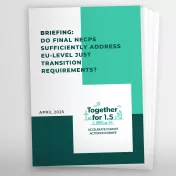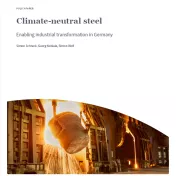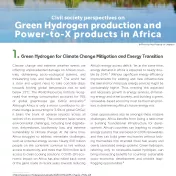
52 major and medium-sized businesses of Germany call at the next German government to do better and more on reaching German and EU climate targets. Amongst the signatories are Adidas, Aldi, Deutsche Telekom, E.on, Hochtief, Metro, Nestlé, SAP and Siemens. Several industry players plus companies being energy intensive or invested into coal have come on board the declaration. Together, they represent more than 500,000 employees in Germany and about 1.5 million globally.
The business majors inter alia ask to aim towards an EU and German emissions reduction target of "up to 95% by 2050" and to further develop the EU ETS, including through supplementary measures. Germany and the EU are called at to jump start the transformation of the transport sector, including through a decisively strengthened rail and local public transport.
The new German government should also support faster growth of renewable energy. And it should make a firm commitment to a socially viable pathway for phasing out coal power.
The declaration is coordinated by Stiftung 2°, Germanwatch e.V., and B.A.U.M. e.V.
The Declaration of German businesses >> Download
"The necessary effort towards a global energy transition has gained new momentum in the wake of the Paris Climate Agreement. Worldwide, the climate accord has augmented corporate planning security, thus spurring higher levels of investment.
After the historic success in Paris and its reaffirmation by world leaders at the G20 summit in Hamburg, the issue of implementation has moved to centre stage in Germany and the European Union. Germany has taken an important first step to improving the reliability of conditions for investing in our carbon-neutral future with its Climate Action Plan 2050 and the sector targets for 2030. We welcome the adoption of these policy measures. Given the right regulatory conditions, the private sector can make an important contribution to achieving the emission targets for Germany and the EU that emerge from the Paris Agreement. We want to do our part to protect the climate, and can do so with forward-looking investment and innovation.
Germany needs a robust strategy for implementing its comparatively stringent emission reduction targets if it does not want to fall behind in the global race to develop carbon-neutral economies.
Ambitious climate protection now represents an important component of economic policy that seeks to ensure reliable conditions for investment while creating and securing jobs. Taking on a vanguard role in climate protection represents a tremendous opportunity for promoting innovation and bolstering Germany's economic competitiveness. The new German government should accelerate the speed of the transformation to a carbon-neutral economy. To this end, it should collaborate closely with partners both in and outside Europe.
- The Climate Action Plan 2050 should be implemented as a reform programme for Germany.
A key task in the coming months will be to create reliable conditions for investment. To this end, the coalition agreement should make a binding commitment to implementing the Climate Action Plan. Furthermore, legislators should prioritise the development of implementation plans and associated concrete measures for achieving the Plan's 2030 sector targets.
- The coalition agreement should bolster the Energiewende (energy transition) and energy efficiency revolution as essential drivers of innovation.
This includes supporting faster growth of renewable energy through Germany’s new competitive bidding process as well as greater electricity savings in order to enable the broad electrification of the transport, heating and industrial sectors. The expansion of power grids, the deployment of power storage systems and the digital transformation need to be accelerated in tandem with better European cooperation in order to promote the clean energy transition and greater efficiency. The coalition parties should speed up the energyefficient refurbishment of buildings, e.g. through tax incentives. They should also make a firm commitment to a socially viable pathway for phasing out coal power. Germany’s carbon-intensive power plant capacities should be gradually reduced in a manner that does not lose sight of power system reliability or climate targets; effective CO2 pricing should be a key mechanism for achieving this goal.
- In order to promote investment security in Germany and the EU, the emissions trading scheme should be further developed through supplementary measures for an effective CO2 price signal.
Legislators should consider reforming the system of taxes and levies as well as abolishing fossil fuel subsidies by 2025. The adoption of such reforms would strengthen Germany's and the EU's ability to advocate similar approaches at future G20 meetings. Germany's energy-intensive industrial companies require a smart policy framework that safeguards their international competitiveness while enabling the necessary low-carbon transition.
- Germany and the EU need to jump start the transformation of the transport sector.
A comprehensive low-carbon strategy for the transport sector needs to be developed. Specifically, measures should be enacted to decisively strengthen rail and local public transport, e.g. through speeding up the development and modernisation of infrastructure. Additional measures are also needed in order to encourage the use of low-emission drive technologies and fuels, e.g. by promoting electric vehicles.
- We expect the new German government to enact decisive and efficient measures to promote the attainment of the national emissions target for 2020.
Germany's and the EU's long-term climate target needs to be brought in alignment with the goals of the Paris Agreement prior to the UN climate summit in 2020. This means adhering to the upper edge of the current emissions corridor and setting the goal of a reduction up to 95% by 2050."




